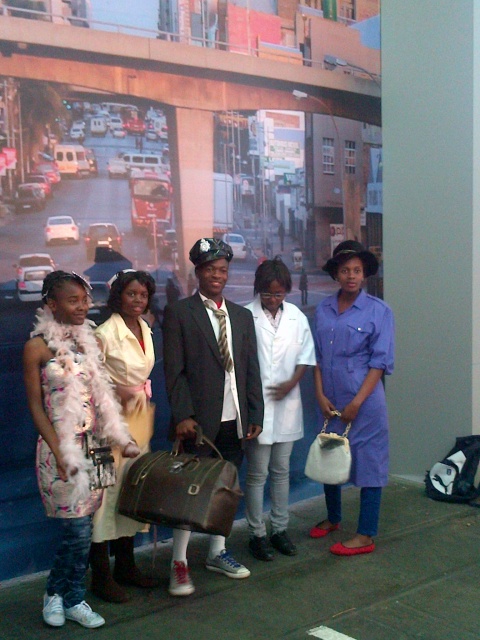
Who said young people couldn’t create, direct, produce, film and act in their own movie.
About 30 Ikamvanites in Gauteng had the opportunity on Saturday 22nd of September 2012, to go onto a professional movie set in Johanesburg at The Home Movie Factory and create their own master pieces.
The Home Movie Factory is an initiative created by Michael Gondry upon the idea that filmmaker creativity should be cultivated and shared as much as possible. Michael said,“I don’t intend nor have the pretension to teach how to make films. Quite the contrary. I intend to prove that people can enjoy their time without being part of the commercial system and serving it. Ultimately, I am hoping to create a network of creativity and communication that is guaranteed to be free.”
The Ikamvanites arrived to a ready-to-use film set and equipment which made an infinite number of storylines possible. The learners got to work independently and had creative control over all aspects of the movie and this included the genre and title of their film, the script, the acting and actual filming.

After three hours, the learners were able to see a screening of their film and were given DVD copies of the final product.
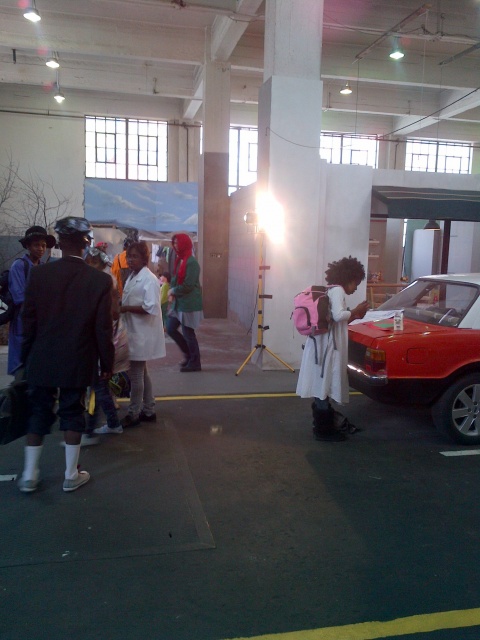
WOW is all I can say. It was amazing experience! We definately have some very creative young Ikamvanites here in Gauteng.
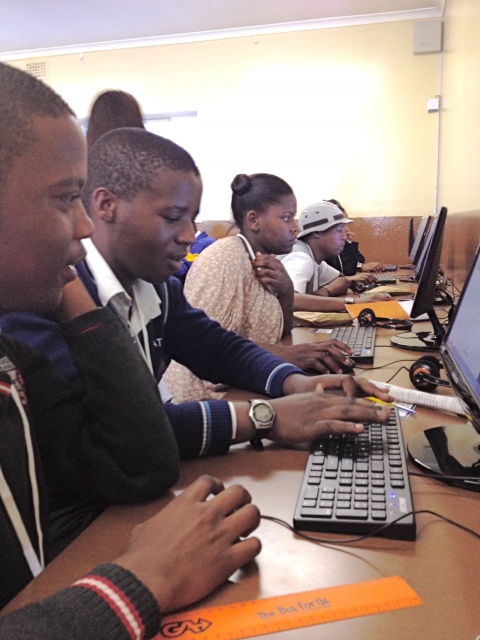
This past Friday finally saw months of preparation and planning for our annual Career Indaba come together in a hugely successful day. Over 1800 students, parents, and community members flooded the Zolani Centre hall in Nyanga to explore their post matric choices and job opportunities.
IkamvaYouth’s founding motto is one of future-oriented thinking and pro-activity. The Careers Indaba is a fundamental step in fostering this mind set in the youth of South Africa. It is challenging to dream of a better future and to aspire to goals without knowing the realities of these goals and the opportunities that are available.

The event was open to high school learners from around Khayelitsha, Nyanga, Masiphumelele and surrounds, who came together to think about their futures and really take their lives into their own hands. They were informed not only about their career options, but also attended workshops on financial literacy by Capitec, and CV writing, interview skills and online CV development through Career Planet.
Over 25 Universities, companies, professionals and NPOs from all over Cape Town attended the Indaba as exhibitors. They did not merely provide factual information about careers and studying opportunities, but they also conversed with these young people and delivered a message of hope and possibility. This message is crucial for youth who are the victims of poor education systems and who live in a community plagued by poverty and all its products: IkamvaYouth focuses on changing the mind-set of youth, to think beyond their immediate circumstances and to believe in themselves and the possibilities that their futures hold.
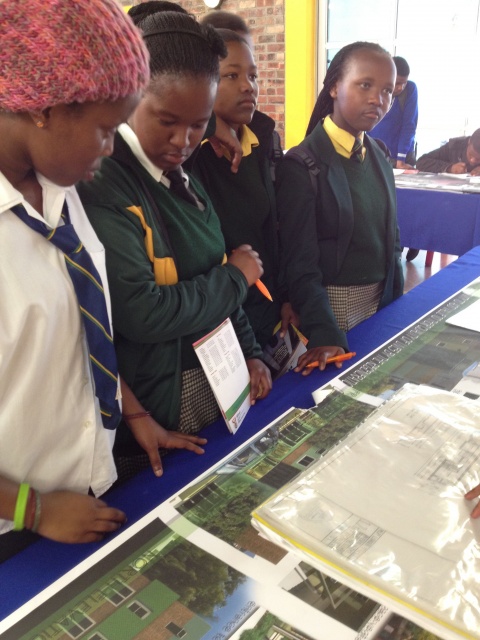
The day was an inspiring success, with many learners and exhibitors commented at how much they had gained from the experience. Axolile, grade 10 from Sizimisle Technical High School said the most important thing he learnt is, ‘to know what you want to be in life and be dedicated, this will for sure get you to be where you want to be. ‘ While Sizalobuhle from Sinako High School said that, ‘ the Career Indaba helped me learn more about my dream career of being a lawyer, where to study and how to get into the best courses and universities. I also found out about how to apply for bursaries, and how to manage my money through the workshops.’
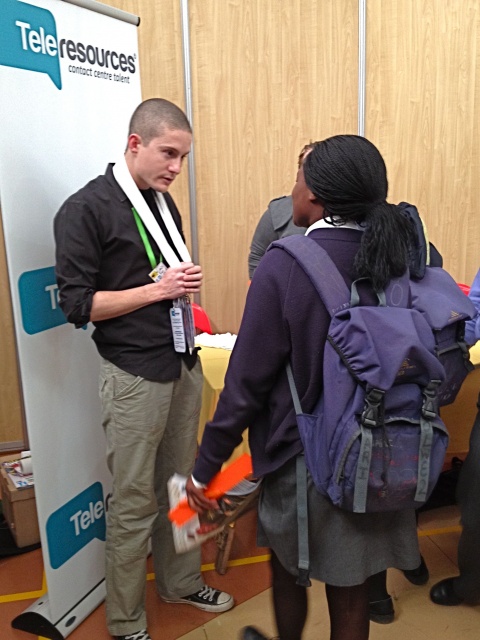
To organize an event of this size we partnered with Equal Education in helping to organize exhibitors and set up the event, and SAEP and the Department of Social Development joined the crew. We are also hugely appreciative to Mxolisi and his team at the Zolani Centre for the use of the hall and surrounding spaces.
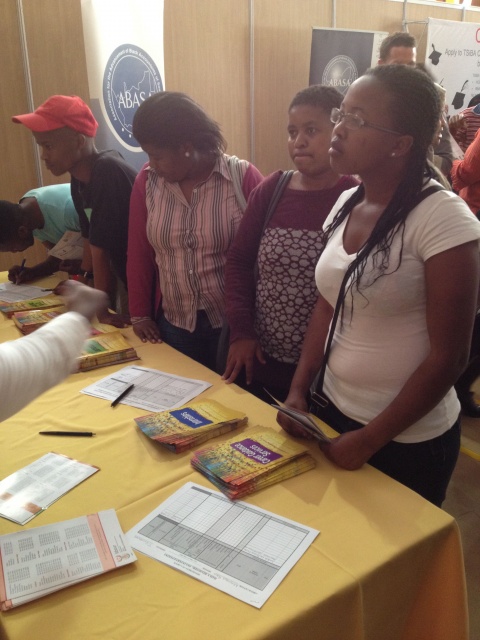
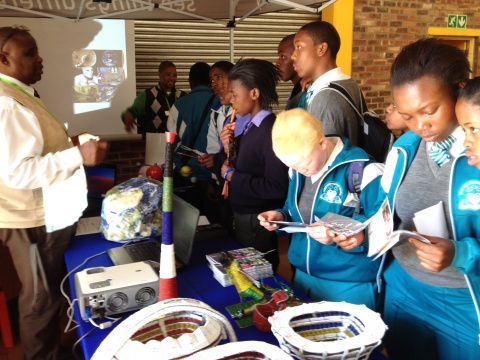
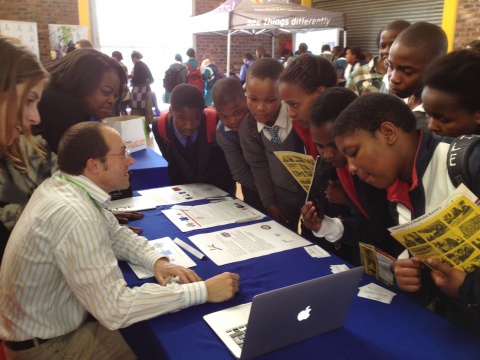
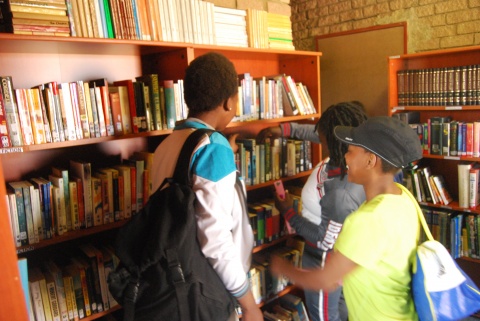
On Saturday, 25 August, Ikamva Youth’s Ebony Park Branch opened it’s own library. It was opened after a ceremony introducing the Ikamvanites to the library and its rules. After watching entertaining videos on the wonder of books, learners made their own bookmarks in anticipation of reading the library’s books. After the ceremony, excited Ikamvanites were allowed to go to the library. For the first time books were taken out of the newly established library. Hopefully this will expose them to the joys of books, establishing a culture of reading at the Ebony Park Branch.

(Ikamvanites deciding which books to take out from the library)
Just over a year ago, Ikamva volunteer Nthabiseng Mokoena realised that the Ikamvanites lacked access to books. After consulting with other volunteers at the Branch, as well as Ikamva employees, she decided to start a library. With a generous donation of book shelves from Robert Barkahuizen, the process of the forming the library began. Nthabiseng, and fellow volunteer Samuel Suttner, collected books from various sources, including family, friends, and fellow Wits’ students. There were considerable donations from Pat Tucker and from the Matla Runners, and assistance from Prof. Bhekizizwe Peterson and the Wits Volunteer Programme.
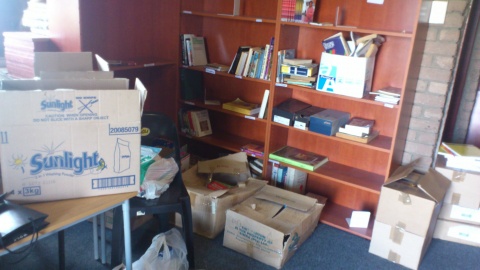
(The library, still a work in progress)
Once the books were collected, the arduous task of setting up a cataloguing system for the library began. With the help of a former librarian, Lucille Katz, and Lucy Verbeek, this was done over many months. They set out the library, categorising and cataloguing the many books
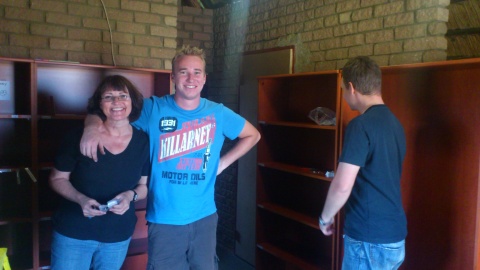
(Lucy Verbeek (left) and her son helping out with the library.)
There was no funding for the library; all the resources for it were donated by people who believed in the importance of having a library for the Ikamvanites. The views of those who assisted with the establishment of the library were expressed by the novelist Zadie Smith: “A lot of people don’t have books on their shelves. The library was the place I went to find out what there was to know. It was absolutely essential.”
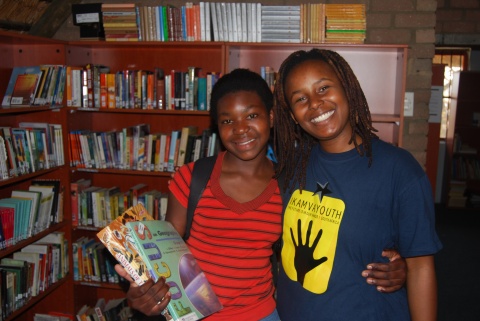
(An Ikamvanite takes out books, with volunteer Nthabiseng Mokoena – right).
We would like to thank the following people for their assistance:
Andrew Barrett; Hlengiwe Radebe; Judy Engela; Karuna Singh; Gill Laburn and the Matla Runners; Lucille Katz; Lucy Verbeek; Nyasha Mutasa; Pat Tucker; Patrick Zimba; Prof. Bhekizizwe Peterson; Robert Barkahuizen; Seth Musker; Stephanie Simpson; Talent Mzili; Thapelo Mokoena; Tiffany Ebrahim; Wits Volunteer Programme, Wits University; Wits Bachelor of Accounting Science, Fourth Year Class of 2012.
Written by Nthabiseng Mokoena and Samuel Suttner

(Listen to the actual debate at http://www.bbc.co.uk/radio/player/p00x8h4d)
Ikamvanites in Gauteng were invited to take part in the BBC Africa Debate at the University of the Witwatersrand on the 31st of August. The question posed was: South Africa at 18- Does black and white still matter in the rainbow nation? (Unfortunately, due to the nature of the topic and the manner in which BBC radio created the racial references, this article will also be using such terms.)
The debate was hosted by BBC radio presenters, Audrey Brown and Karen Allen, and a panel of speakers selected by BBC in an attempt to represent the “Born Free Generation” as people born on or post 1994. The panel was a strategized mix of Black and White persons from St Benedict’s Private School, Pretoria Boy’s High and Wits Students in an attempt to represent “all” youth. The audience consisted of political party representatives, organisations like Ikamva Youth and academics.
The panellists were divided both racially and with their opinions. However, their opinions were not divided according to race as predicted. Throughout the debate, depending on one’s personal background, circles of influence, experiences and current state of affairs, people felt and saw things differently.
Some youth stated that race does still matter and is still used as a form of identifying and relating to people – finding a commonness (based on cultural, linguistic and socio-economic) amongst a diversified crowd and finding it easier to socialise better with people who have the same social backgrounds. Is this based on the fear of rejection and the need for belonging that most humans feel? On the other hand, as highlighted by the presenters, race is possibly merely used as a code to cover up other issues, such as how race is experienced on a social level. It was great to see that after the debate, the IkamvaYouth learners, also Born Free, interacted with people outside of their normal circle – spreading their horizons.
Some of the issues raised involved nationalisation,education and poverty. A poll was raised and showed that the majority of the attendees were against nationalisation. In terms of the economy, some ‘Born Free’ learners argued that the need is for South Africa to focus on the mines and entrepreneurs to grow the national economy in order to develop society. The issue of shared wealth was then raised and with this race dimensions came up again. A majority of the audience share the view that the majority of poor people are black because the majority of South Africans are black and it is an underdeveloped country – hence the poverty. However, many still see it as: Black people are poor because they are black and financial status is a racial issue construed by the past racial injustices.
Most issues that were given attention were national issues. Policies of Apartheid reformation such as Affirmative Action, BEE and the Constitution were brought up and their role in healing the racial divide were questioned. Unemployment and access to equal opportunities is an evident issue that maintains the gap between the rich and poor. With statistics showing that South Africa has overtaken Brazil GINI ratio – wealthiest. White per capita is 8 times more than black per capita.
This shows that real issues facing South Africans are issues of inequality based on many issues with race only being a structural component created by history and inherently inherited.It was largely seen that differences in race still matters only because South Africans make it matter. All the views of participants were forcibly related to racialism and were rarely from a personal experience of injustice. It seems that society continues to insist on segregation economically, linguistically, geographically and ethnically. One of the audience members noted that: ‘the rainbow colours never mix’, maybe it is inherently human nature to distinguish through separation rather than taking advantage of differences to enhance the whole. There is a shared fear of being different because South Africans were once forced to be different based on race only. The question posed was: when will South Africans stop being forced as well as force ourselves to view one another as Black and White?
IkamvaYouth is at the core at tackling these issues and is a community that is aware, wants to be heard and has the power to make a greater change – The views many Ikamvanites have are from a personal and sincere point of view. These views matter and make issues and discussions more linked to the humaneness of the issues people face on their daily lives.

Ikamvanites, Speak Out! Only you can represent your views with the intensity that they should be viewed. If you feel strong about something – Shout!
Thank you IkamvaYouth for showing us that our voice matters!
Written by Kihisha Suleman (Volunteer in charge of Career Guidance at Ebony Park)
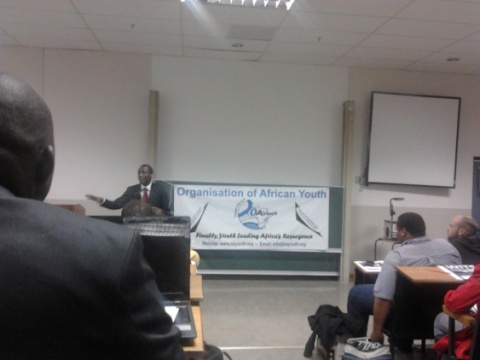
The event, which took place on the 18th of August, was an attempt at creating a platform for the youth as individuals, and representing organisations, to discuss issues and challenges facing South Africa, and contribute in generating solutions. The event was hosted by the Organisation of African Youth, in partnership with the Wits Disability Unit and The Consulting Academy.
The Symposium, the first of many that shall foster platform for the youth to begin setting the agenda and enabling environment to discuss issues affecting the country as a whole, and not remain pedestrian by-standers in issues of national interest. According to the official guest speaker, Patson Malisa,”We (the youth) are the most important component towards the change and revival of the African Continent,”.
As the crowd discussions commenced, the audience still referred to “they” and “I” rather than forming a collective group of responsible youth. Patson highlighted the importance of values such as selflessness and the power of united voice as the youth.

A freelance journalist for Mail & Guardian attended the event and was in search for answers. I took a leap to market IkamvaYouth and told him the importance of the event, and that IkamvaYouth as an organisation consisted of youths that are motivated to resolve issues surrounding the education crisis in South Africa. I informed that the IkamvaYouth model has seen a by-the-youth, for-the-youth revolution in education for all beneficiaries and volunteers.
Representatives of other organisations such as Africa Tycoon and Pretoria Boy’s High provided their perspectives. The lack of leadership was addressed and seen as due to a lack of responsibility and the issues of leaders of the majority being chosen by the minority.
The second issue raised for discussion looked into the gap between the rich and poor. I personally gave insight, stating that the problem lies with a misconception of the meaning of wealth as “What others have that I do not have”. I then provided an alternative school of thought based on the concept of individuals needing to define their own meaning of wealth to attain their personal success. Similarly, one academia stated that the term ‘rich’ must be measured in terms of productivity as that is a true reflection of the attained resources.

The Symposium was a great attempt to a solution driven platform by the youth. While there remains a long way to go in achieving a holistic dimension to contributing to making our country and Africa a better place for everyone, the small efforts of helping one learner at a time as we do at IkamvaYouth is a great step that must never be despised. As the youth, we have what it takes to address all the ills affecting our communities, if only we can be a united front to this end!!
-Kihisha Suleman-
It is important to explore different cultures with others and there are so many ways to do so.
On Tuesday the 14th of August, the Ebony Park homework session was a hub of activity as the volunteer Pakistani interns decided to celebrate Pakistani Independence Day with the learners. After the homework session, Akbar Raza, along with Rafay and Abdul Samad Zia, taught the learners the Pakistani National Anthem ‘Dil Dil Pakistani!!’. The learners and Interns had a real great time. The video of this exciting moment can be viewed
here.
Believe it or not, our young Ikamvanites are on the road to learning “Urdu” the official Pakistani language.

















 Lloyd Lungu
Lloyd Lungu